外研版(2019) 选择性必修第四册 Unit 1 Looking Forwards Understanding ideas 2 课件(29张)
文档属性
| 名称 | 外研版(2019) 选择性必修第四册 Unit 1 Looking Forwards Understanding ideas 2 课件(29张) | 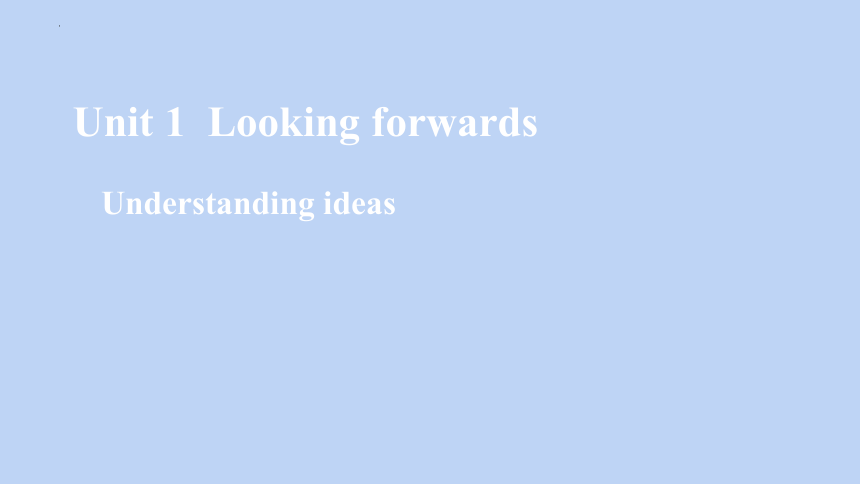 | |
| 格式 | zip | ||
| 文件大小 | 393.5KB | ||
| 资源类型 | 教案 | ||
| 版本资源 | 外研版(2019) | ||
| 科目 | 英语 | ||
| 更新时间 | 2022-08-03 10:34:54 | ||
图片预览


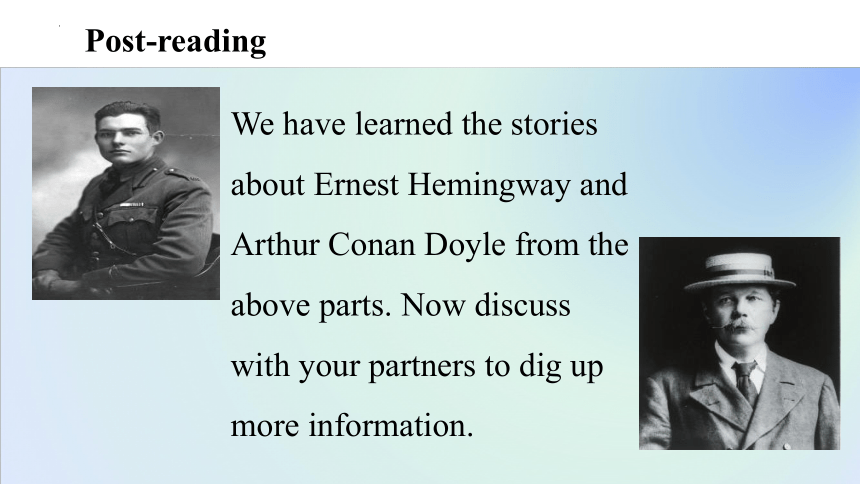
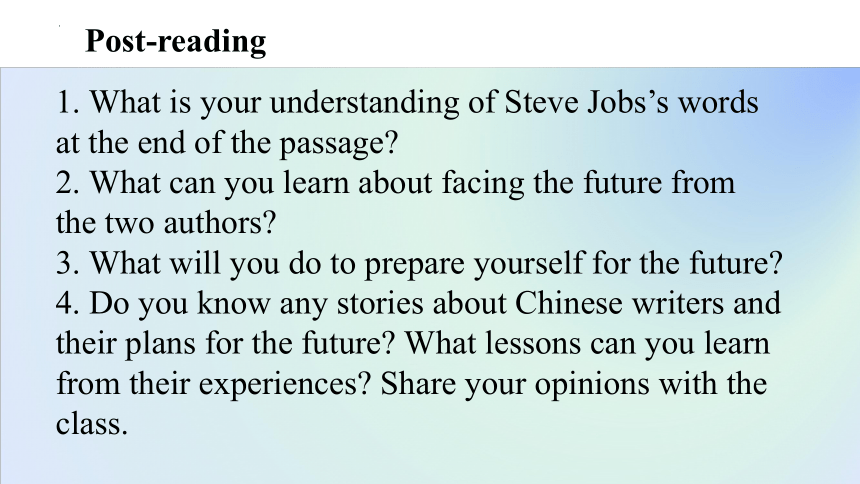
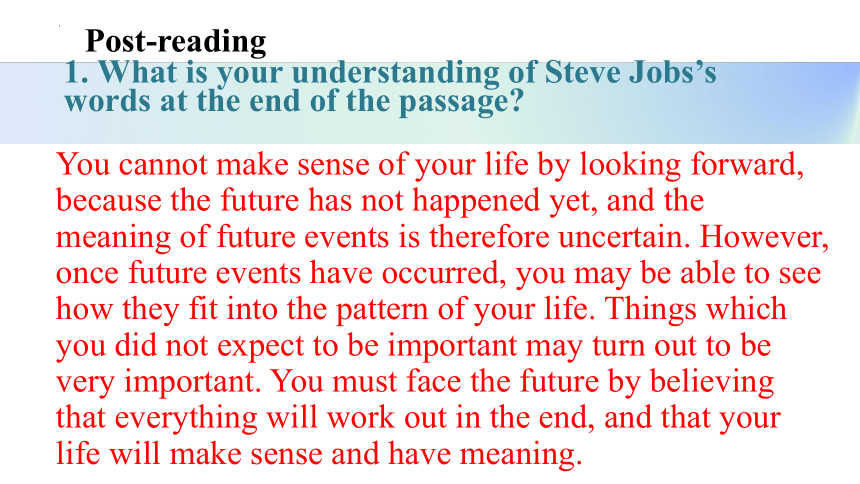
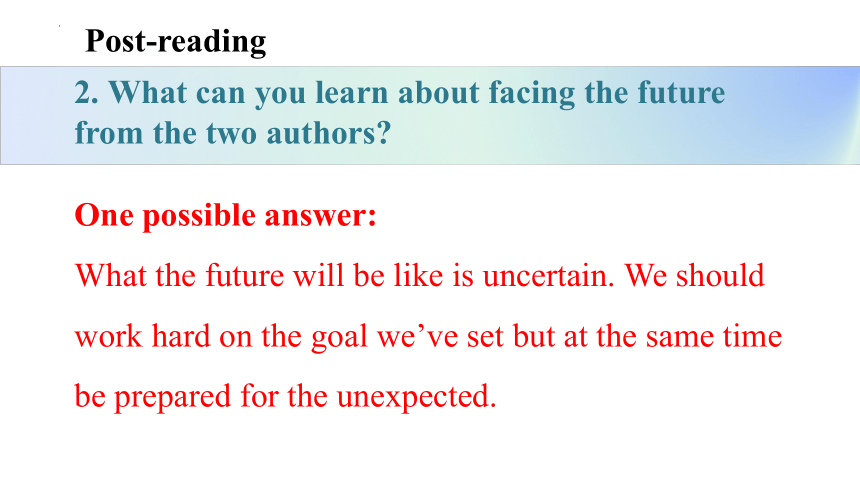
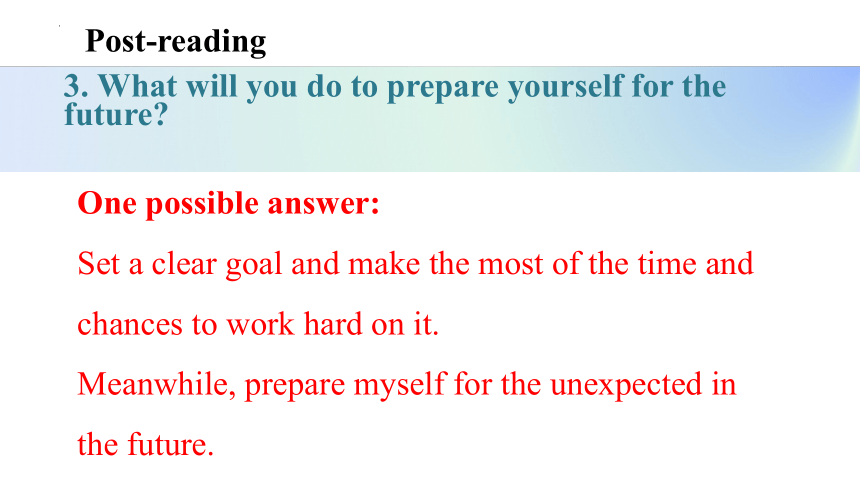
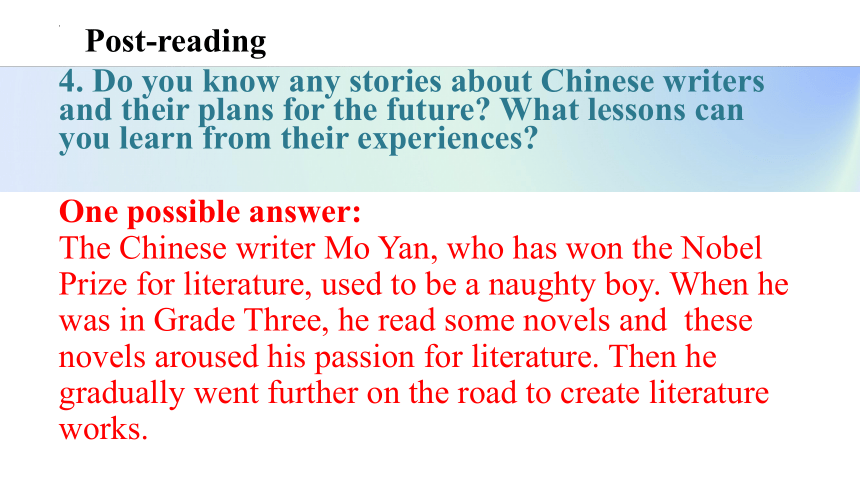

文档简介
(共29张PPT)
Understanding ideas
Unit 1 Looking forwards
Ⅳ
Post-reading
We have learned the stories about Ernest Hemingway and Arthur Conan Doyle from the above parts. Now discuss with your partners to dig up more information.
Post-reading
1. What is your understanding of Steve Jobs’s words at the end of the passage
2. What can you learn about facing the future from the two authors
3. What will you do to prepare yourself for the future
4. Do you know any stories about Chinese writers and their plans for the future What lessons can you learn
from their experiences Share your opinions with the class.
Post-reading
1. What is your understanding of Steve Jobs’s words at the end of the passage
You cannot make sense of your life by looking forward, because the future has not happened yet, and the meaning of future events is therefore uncertain. However, once future events have occurred, you may be able to see how they fit into the pattern of your life. Things which you did not expect to be important may turn out to be very important. You must face the future by believing that everything will work out in the end, and that your life will make sense and have meaning.
Post-reading
2. What can you learn about facing the future from the two authors
One possible answer:
What the future will be like is uncertain. We should work hard on the goal we’ve set but at the same time be prepared for the unexpected.
Post-reading
3. What will you do to prepare yourself for the future
One possible answer:
Set a clear goal and make the most of the time and chances to work hard on it.
Meanwhile, prepare myself for the unexpected in the future.
Post-reading
4. Do you know any stories about Chinese writers and their plans for the future What lessons can you learn from their experiences
One possible answer:
The Chinese writer Mo Yan, who has won the Nobel Prize for literature, used to be a naughty boy. When he was in Grade Three, he read some novels and these novels aroused his passion for literature. Then he gradually went further on the road to create literature works.
Post-reading
Language points
Ⅴ
He didn’t approach the front door at once.
他没有马上走向前门。
approach v.
① 靠近;接近;走近
Language points
② 临近;来临
As autumn approached, the plants and colours in the garden
changed. 秋天临近,花园中的草木和颜色也发生了变化。
Language points
③ 探讨;处理;对待
The Bank has approached the issue in a practical way.
银行已经实际解决了这个问题。
① 路径;途径;道路
The path serves as an approach to the boat house.
这条小路通往船屋。
approach n.
② 方法;态度;手段
We will be exploring different approaches to gathering
information. 我们将探索收集信息的不同方法。
approach 作名词用,常和介词 to 连用。
Language points
① 遇到,遭遇(问题、困难)
Every day of our lives we encounter stresses of one
kind or another. 在每天的生活中我们会遇到这样或
那样的压力。
2. encounter v.
② 偶遇;邂逅
Did you encounter anyone in the building
你在大楼里遇到谁了么?
Language points
The author tells of a remarkable encounter with a group of South Vietnamese soldiers. 作者讲述了和一群南越士兵的奇遇。
encounter n. 偶遇;邂逅;(重要的)相逢
Language points
1. worry about __________________
2. take action to do sth __________________
3. come one’s way __________________
4. on doing sth __________________
5. by contrast __________________
担心;担忧
发生在某人身上
采取行动做某事
一……就……
相比之下;与……相反
Language points
6. be known for ___________________
7. devote oneself to doing sth ___________________
8. long to do sth ___________________
9. turn out ___________________
10. be prepared for ___________________
专注于做某事
渴望做某事
证明是;结果是;原来是
因……而著名
为……做好准备
Language points
1. Will we get into the school of our choice
Paraphrase: Will we be admitted to the school that we choose for ourselves
of one’s choice 是介词短语在句中作后置定语,起着定语从句的作用。
Language points
在本篇文章中,用介词短语代替从句(状语从句),或代替分词短语的句子还有:
In the face of such questions, how should we approach the future
介词短语 in the face of 相当于 when 或 if 引导的状语从句:When / If we face such questions, how should we approach the future
或相当于分词 faced with 或 facing引导的句子:Faced with / Facing such questions, how should we approach the future
Language points
在本篇文章中,用介词短语代替从句(状语从句),或代替分词短语的句子还有:
In the face of such questions, how should we approach the future
介词短语 in the face of 相当于 when 或 if 引导的状语从句:When / If we face such questions, how should we approach the future
Language points
2. In this respect, some people are more fortunate than others, as can be illustrated by comparing the lives of two famous authors, born 40 years apart.
Paraphrase: Considering this, some people are luckier than others. This can be shown by comparing the lives of two famous authors who were born 40 years apart.
句中短语 in this respect 表示“在这方面”。
Language points
例如:
Let me give another example to illustrate this point.
让我举另一个例子来阐明这一点。
illustrate 是动词,意为“阐明” 。
illustrate 是动词,它的名词形式为 illustration。
Language points
3. Although they shared the same ambitious and energetic approach to life, their careers unfolded in contrasting ways.
Paraphrase: They were both ambitious and energetic people, but their careers turned out to be very different.
本句中的 share 意为 to have the same opinion, experience, feeling etc as someone else。
Language points
I share your concern about this.
我和你一样为此担心。
We both share an interest: playing chess after work.
我们有个共同的兴趣爱好:下班后下棋。
Robert is the only person who shares my opinion.
Robert是唯一和我意见相同的人。
share 还可用于:share sth with sb 和某人分享某物
Language points
本句中的 unfolded in contrasting ways 意为 developed in quite different ways。
例如:
Facing the future academic planning, they unfolded in contrasting ways.
面对未来的学术规划,它们以截然不同的方式发展。
Language points
4. The American author, Ernest Hemingway, born in 1899, was from early boyhood single-minded in his ambition to write.
Paraphrase: Ernest Hemingway, an American author who was born in 1899, had only one ambition in his life since childhood: to write.
本句中的短语 born in 1899 相当于一个非限制性定语从句,可以用 who 引导的定语从句 who was born in 1899 替换。
Language points
本句中的 single-minded 意为 very determined to achieve something。
例如:
Her single-minded commitment to the job meant that she had little time left for her family. 她对工作一心一意的奉献意味着她很少有时间留给自己的家庭。
single-minded 是一种常见的合成词构词现象,由“adj. + n. + -ed”构成一个合成形容词。
Language points
类似的还有 absent-minded, warm-hearted, cold-blooded, bad-tempered, short-sighted, iron-willed, bare-handed, long-legged, short-armed 等。
在合成词的构词中,adj. 还可以用 num. 替换,构成合成形容词,如:one-eyed, four-legged, five-fingered, three-toed 等。
Language points
VI
Homework
Homework
1. Summarize what you’ve learnt today;
2. Search the Internet to know more about the two authors and some famous Chinese writers.
Understanding ideas
Unit 1 Looking forwards
Ⅳ
Post-reading
We have learned the stories about Ernest Hemingway and Arthur Conan Doyle from the above parts. Now discuss with your partners to dig up more information.
Post-reading
1. What is your understanding of Steve Jobs’s words at the end of the passage
2. What can you learn about facing the future from the two authors
3. What will you do to prepare yourself for the future
4. Do you know any stories about Chinese writers and their plans for the future What lessons can you learn
from their experiences Share your opinions with the class.
Post-reading
1. What is your understanding of Steve Jobs’s words at the end of the passage
You cannot make sense of your life by looking forward, because the future has not happened yet, and the meaning of future events is therefore uncertain. However, once future events have occurred, you may be able to see how they fit into the pattern of your life. Things which you did not expect to be important may turn out to be very important. You must face the future by believing that everything will work out in the end, and that your life will make sense and have meaning.
Post-reading
2. What can you learn about facing the future from the two authors
One possible answer:
What the future will be like is uncertain. We should work hard on the goal we’ve set but at the same time be prepared for the unexpected.
Post-reading
3. What will you do to prepare yourself for the future
One possible answer:
Set a clear goal and make the most of the time and chances to work hard on it.
Meanwhile, prepare myself for the unexpected in the future.
Post-reading
4. Do you know any stories about Chinese writers and their plans for the future What lessons can you learn from their experiences
One possible answer:
The Chinese writer Mo Yan, who has won the Nobel Prize for literature, used to be a naughty boy. When he was in Grade Three, he read some novels and these novels aroused his passion for literature. Then he gradually went further on the road to create literature works.
Post-reading
Language points
Ⅴ
He didn’t approach the front door at once.
他没有马上走向前门。
approach v.
① 靠近;接近;走近
Language points
② 临近;来临
As autumn approached, the plants and colours in the garden
changed. 秋天临近,花园中的草木和颜色也发生了变化。
Language points
③ 探讨;处理;对待
The Bank has approached the issue in a practical way.
银行已经实际解决了这个问题。
① 路径;途径;道路
The path serves as an approach to the boat house.
这条小路通往船屋。
approach n.
② 方法;态度;手段
We will be exploring different approaches to gathering
information. 我们将探索收集信息的不同方法。
approach 作名词用,常和介词 to 连用。
Language points
① 遇到,遭遇(问题、困难)
Every day of our lives we encounter stresses of one
kind or another. 在每天的生活中我们会遇到这样或
那样的压力。
2. encounter v.
② 偶遇;邂逅
Did you encounter anyone in the building
你在大楼里遇到谁了么?
Language points
The author tells of a remarkable encounter with a group of South Vietnamese soldiers. 作者讲述了和一群南越士兵的奇遇。
encounter n. 偶遇;邂逅;(重要的)相逢
Language points
1. worry about __________________
2. take action to do sth __________________
3. come one’s way __________________
4. on doing sth __________________
5. by contrast __________________
担心;担忧
发生在某人身上
采取行动做某事
一……就……
相比之下;与……相反
Language points
6. be known for ___________________
7. devote oneself to doing sth ___________________
8. long to do sth ___________________
9. turn out ___________________
10. be prepared for ___________________
专注于做某事
渴望做某事
证明是;结果是;原来是
因……而著名
为……做好准备
Language points
1. Will we get into the school of our choice
Paraphrase: Will we be admitted to the school that we choose for ourselves
of one’s choice 是介词短语在句中作后置定语,起着定语从句的作用。
Language points
在本篇文章中,用介词短语代替从句(状语从句),或代替分词短语的句子还有:
In the face of such questions, how should we approach the future
介词短语 in the face of 相当于 when 或 if 引导的状语从句:When / If we face such questions, how should we approach the future
或相当于分词 faced with 或 facing引导的句子:Faced with / Facing such questions, how should we approach the future
Language points
在本篇文章中,用介词短语代替从句(状语从句),或代替分词短语的句子还有:
In the face of such questions, how should we approach the future
介词短语 in the face of 相当于 when 或 if 引导的状语从句:When / If we face such questions, how should we approach the future
Language points
2. In this respect, some people are more fortunate than others, as can be illustrated by comparing the lives of two famous authors, born 40 years apart.
Paraphrase: Considering this, some people are luckier than others. This can be shown by comparing the lives of two famous authors who were born 40 years apart.
句中短语 in this respect 表示“在这方面”。
Language points
例如:
Let me give another example to illustrate this point.
让我举另一个例子来阐明这一点。
illustrate 是动词,意为“阐明” 。
illustrate 是动词,它的名词形式为 illustration。
Language points
3. Although they shared the same ambitious and energetic approach to life, their careers unfolded in contrasting ways.
Paraphrase: They were both ambitious and energetic people, but their careers turned out to be very different.
本句中的 share 意为 to have the same opinion, experience, feeling etc as someone else。
Language points
I share your concern about this.
我和你一样为此担心。
We both share an interest: playing chess after work.
我们有个共同的兴趣爱好:下班后下棋。
Robert is the only person who shares my opinion.
Robert是唯一和我意见相同的人。
share 还可用于:share sth with sb 和某人分享某物
Language points
本句中的 unfolded in contrasting ways 意为 developed in quite different ways。
例如:
Facing the future academic planning, they unfolded in contrasting ways.
面对未来的学术规划,它们以截然不同的方式发展。
Language points
4. The American author, Ernest Hemingway, born in 1899, was from early boyhood single-minded in his ambition to write.
Paraphrase: Ernest Hemingway, an American author who was born in 1899, had only one ambition in his life since childhood: to write.
本句中的短语 born in 1899 相当于一个非限制性定语从句,可以用 who 引导的定语从句 who was born in 1899 替换。
Language points
本句中的 single-minded 意为 very determined to achieve something。
例如:
Her single-minded commitment to the job meant that she had little time left for her family. 她对工作一心一意的奉献意味着她很少有时间留给自己的家庭。
single-minded 是一种常见的合成词构词现象,由“adj. + n. + -ed”构成一个合成形容词。
Language points
类似的还有 absent-minded, warm-hearted, cold-blooded, bad-tempered, short-sighted, iron-willed, bare-handed, long-legged, short-armed 等。
在合成词的构词中,adj. 还可以用 num. 替换,构成合成形容词,如:one-eyed, four-legged, five-fingered, three-toed 等。
Language points
VI
Homework
Homework
1. Summarize what you’ve learnt today;
2. Search the Internet to know more about the two authors and some famous Chinese writers.
